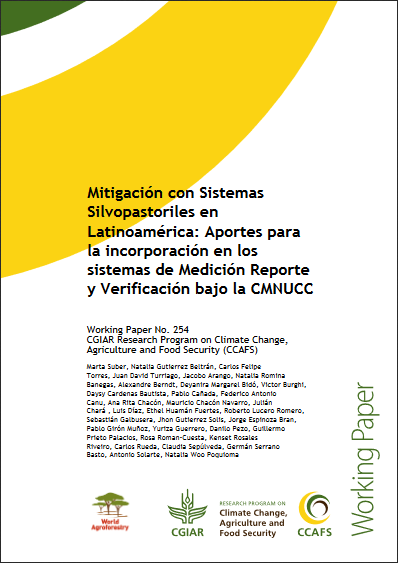Trees in Latin American silvopastoral systems are a powerful mitigation resource

A new publication by leading Latin American experts shows the path for the enhancement of monitoring and reporting of silvopastoral systems.
Silvopastoral systems are land-use practices in which trees are integrated into livestock production. Their potential for carbon sequestration has long been recognized in principle, but much neglected in practice. A recent report by 31 leading Latin American specialists in silvopastoral systems and the United Nations Framework Convention on Climate Change (UNFCCC) Monitoring, Reporting and Verification (MRV) framework now offers guidance on how to fill this gap.
The lead author, World Agroforestry’s (ICRAF) Marta Suber, comments, “in Latin America, silvopastoral systems are widespread and traditional way of land-use. We believe that our report will be key to ‘putting them on the map’ with regard to countries’ commitments under the Paris Agreement. Right now, they’re pretty much invisible.”
Read the Working Paper here |
“The problem is two-fold,” adds Juan David Turriago, designer of the Agriculture, Forestry and Other Land Use (AFOLU) MRV system for the greenhouse gases national inventory of Colombia for the Institute of Environmental Studies (IDEAM) in charge of the national MRV. “First, a lot of the time these systems and the trees in them are simply not taken into account. Second, even when they are recognized, the guidance on how to account for them is not up to the job.”
Most Latin America countries have identified the livestock sector as a priority for mitigation actions. However, effective action will depend very much on correction of the deficiencies in the MRV of silvopastoral systems.
If you can’t define it, then you can’t ‘MRV it’
Only five Latin American countries have official definitions of silvopastoral systems. Furthermore, some officially recognized land use types may or may not include them, adding to the potential for both omissions and double-counting. A key priority for the report was therefore to establish criteria for the inclusion of silvopastoral systems in national MRV systems. Two conditions were identified:
- The inclusion of animals, pastures, and trees in the same productive area
- The areas in question must be ‘transformed ecosystems’, i.e. not natural, pristine forests
The report provides guidance on the ‘how to’ of MRV of silvopastoral systems, including a decision-tree and a region-specific roadmap outlinining the choices and steps required to include them within national MRV systems.
Early impact
The report’s findings were already put to use in a high-level workshop on the design of the national Land Covers, Land Uses and Ecosystems Monitoring System (SIMOCUTE) in Costa Rica. Workshop participant Mauricio Chacón, leader of the national Low Emission Livestock Strategy and the Livestock Nationally Appropriate Mitigation Action (NAMA) of Costa Rica, comments, “the report was really useful to us—we’ve already agreed on a follow-up workshop to work on descriptors that we can use for the Costa Rican Livestock NAMA and, under the same MRV principles applicable also to agroforestry, expand to the Coffee NAMA too.”
Looking to the future
The co-authors of the report, together with other experts, have come together in a regional network of technical experts interested in ensuring that their countries’ climate-change strategies take into account the contribution of silvopastoral systems to mitigation.
In this regard, Jacobo Arango, scientist from the International Center for Tropical Agriculture (CIAT) and leader of the LivestockPlus project, said: "We are very pleased with the collective product of this MRV network in Latin America we have established and we are aiming to continue the work during 2019 and beyond with the support of the Livestock project and the CGIAR Research Program on Climate Change, Agriculture and Food Security (CCAFS)".
Read more:
- Working Paper: Mitigación con Sistemas Silvopastoriles en Latinoamérica. Aportes para la incorporación en los sistemas de Medición, Reporte y Verificación bajo la CMUNCC.
Acknowledgments
The report Mitigation with Silvopastoral Systems in Latin America is the product of a participatory, multi-actor process led by World Agroforestry (ICRAF) scientists as part of the LivestockPlus of the CGIAR Research Program on Climate Change, Agriculture and Food Security (CCAFS).
Jonathan Cornelius is the Regional Coordinator for the World Agroforestry (ICRAF) in Latin America.

